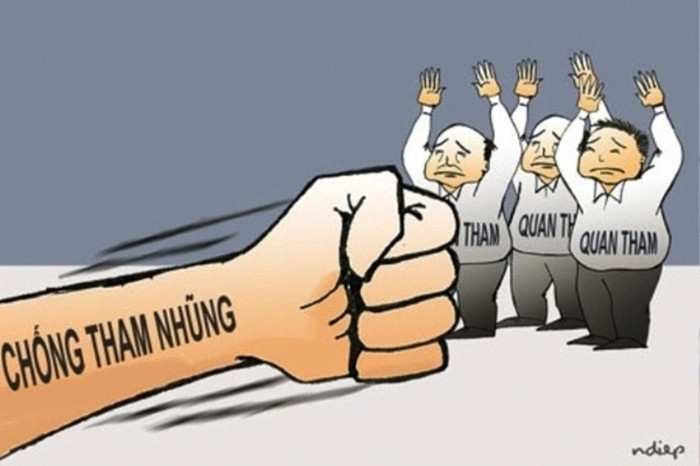
In Vietnam, corruption is one of the risks which reduces people’s trust in the Party, State, and socialist regime.

In fact, corruption and negativity in recent times has been found in many fields at different scales, causing a great loss or heavy damage to society whilst also provoking much public frustration.
Causes identified
Together with the development of the market economy, corrupt actions ranging from petty corruption to grand corruption, are diverse, complex, and increasingly sophisticated, all of which are factors in making them difficult to detect. They take place not only in the public sector, but also in the private sector, with close connections and collusion between ranking officials and businesses.
The deterioration of political ideology, ethics, and lifestyle, especially the manifestations of “self-evolution” and “self-transformation” among a segment of ranking officials and Party members, is largely to blame for such documented corrupt behaviour. This is a huge challenge which requires the Party and State to take resolute, comprehensive, and thorough measures aimed at preventing and handling corruption and negativity, with a primary focus on controlling the power of those who have power and responsibility in corruption prevention.
Furthermore, globalisation and international economic integration have a significant downside impact, giving rise to false political perceptions among a number of ranking officials and Party members. Many officials fall victim to material temptations and forget their oath of putting the interests of the Fatherland, the Party, and the people above personal interests
In line with this, several hostile forces deploy anti-Vietnam schemes by carrying out plots of “peaceful evolution”, “self-evolution”, and “self-transformation” with a view to changing the political ideology of a segment of ranking officials and Party members, lowering the Party’s leadership role and negating the path to socialism in the country.
Meanwhile, institutions for socio-economic management and anti-corruption prevention still reveal shortcomings, creating loopholes for degraded and degenerate officials and Party members to take advantage of in order to commit acts of corruption. Among them are regulations on management and use of state capital and assets at enterprises, as well as regulations on land allocation, land lease, and land recovery.
Solutions proposed
The Communist Party of Vietnam has intensified the fight against corruption and negativity over the years, in the spirit of ‘no forbidden zone” and “no exception”. Many notorious graft scandals of great public concern have been brought to light, with many ranking officials standing trial and receiving stiff prison sentences. However, greater efforts are needed to make the corruption fight more effective.
First of all, competent agencies should continue to focus on detecting and promptly handling corrupt and negative acts, with this being done through inspection, supervision, auditing, investigation, prosecution, and execution of judgment. The inspection, supervision, and auditing work must be conducted regularly, comprehensively, and publicly, with greater emphasis being placed on fields that easily cause negativity and public concern. All officials and Party members who commit violations must therefore be handled promptly, synchronously, strictly, and publicly.
Secondly, the Party building and rectification work should be enhanced, along with further raising awareness of anti-corruption among officials, Party members, and the people. Indeed, weak and erroneous awareness of several Party organisations, officials, Party members, and people about corruption prevention and control is one of the main reasons leading to the limitations and shortcomings of anti-corruption work in recent times.
Thirdly, the power control mechanism within the Party, State, and political system must be perfected in order to crack down on the abuse of power among ranking officials and Party members in high positions. Accordingly, the exercise of power for people in high positions must be strictly controlled, in which authority must be bound with responsibility, with the higher the authority, the greater the responsibility. There must therefore be specific sanctions placed on officials and Party members who commit corrupt and negative acts in many fields.
Fourthly, it can be considered imperative to perfect socio-economic management institutions aimed at closing loopholes and making corruption impossible. To this end, competent agencies should review, amend, supplement, and improve legal regulations on socio-economic development, accountability, publicity, and transparency in management and use of State budget and assets, land, natural resources, minerals, as well as the equitisation of State-owned enterprises.
Last but not least, it is necessary to speed up salary reform for State employees, which is considered to be one of the important solutions to prevent negative and corrupt actions among ranking officials and Party members. In a resolution issued last November, the Government requested that the Interior Ministry, in collaboration with relevant agencies and localities, review, complete, and concretise regulations on salary reform of the Party and the National Assembly in a bid to ensure the project will be feasible when it is deployed in reality.
Source: VOV